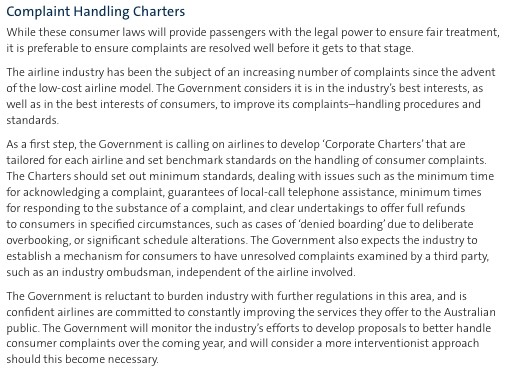
Jetstar launches the first customer guarantee by an Australian airline this Friday morning (including its Asian and New Zealand franchises) by way of social media on YouTube and through media press releases.

Why is it doing this? To neutralise the intentions and risks of proposed air travel consumer protection measures contained in Chapter 5 of the Federal Government’s Aviation White Paper, released in mid December.
This extract sets the scene:
 What is Jetstar’s response?
What is Jetstar’s response?

There are significant problems with this guarantee, the most immediately irritating being the gratuitous inclusion of ‘soft’ marketing motherhood statements within a set of ‘hard’ performance metrics and the compensation for a failure to meet them.
The guarantee makes no mention of an impartial ombudsman to deal with the substantive issues anticipated by the White Paper and leaves Jetstar as the jury and judge for dealing with complaints in which the penalties are paid for by trivial amounts of highly conditional vouchers for future travel on its flights.

If there was an extra zero for the voucher amounts, a minimum of $500 worth of future travel, and no expiry deadline or other picky conditions, or something really meaningful, like full transferability to any other airline of the offended consumer’s choice, we’d know Jetstar was really, truly engaged by the need to keep to its service obligations.
In an air travel market where the cost of taking a train or taxi to most large Australian airports exceeds $50 one way, and where parking can cost more than a return airfare over as little as several days, vouchers valid for a credit off future air fares do not even begin to cover the consequences of airline service failures.
That isn’t to deny recognition of some important commitments by Jetstar to keep customers better informed, in fact, it is already doing a ‘soft’ launch of some very innovative check-in and re-booking and trip advisory functions. But giving the mishandled customer the option to spend a more appropriate $500 or $1000 voucher on the services of Virgin Blue, or those of Air Asia, or Air New Zealand would really focus Jetstar’s mind on keeping its side of the ‘contract’ between customer and airline.
Which also makes it important to query why cash refunds can’t be as fast as a credit or debit card transaction can be reversed. People pay for airline tickets with money. If they don’t get what they paid for they should get their money back. Not funny bits of paper with a value that expires after three months and is laden with conditions and qualifications. It only takes a fraction of a second to take cash off the customer, and the same technology can give it back, just as quickly. Hanging on to the money for more than two weeks is outrageous.
Jetstar has come a long way in getting serious about service delivery. All that is missing now is real money, in meaningful amounts, in the hands of consumers the moment a service guarantee is broken.








Crikey is committed to hosting lively discussions. Help us keep the conversation useful, interesting and welcoming. We aim to publish comments quickly in the interest of promoting robust conversation, but we’re a small team and we deploy filters to protect against legal risk. Occasionally your comment may be held up while we review, but we’re working as fast as we can to keep the conversation rolling.
The Crikey comment section is members-only content. Please subscribe to leave a comment.
The Crikey comment section is members-only content. Please login to leave a comment.